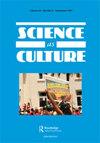中国主导科技推广政策面临的人文主义挑战
IF 2.5
3区 哲学
Q1 CULTURAL STUDIES
引用次数: 1
摘要
本文章由计算机程序翻译,如有差异,请以英文原文为准。
The humanist challenge to China’s dominant policies for popularizing science and technology (PST)
ABSTRACT In the early 2000s, a group of Chinese scholars who often refer to themselves as scientific humanists (科学文化人, or 科学人文主义者) launched a critique of dominant approaches to science popularization known as ‘kepu’ or science popularization (科普). Their scientific humanism connects traditional Chinese ideas about scientism and humanism to Western philosophy and STS, in particular the sociology of scientific knowledge. Challenging science popularization policies, the scientific humanists in 2001 launched the so-called Critical School of Science Communication (CSSC), which combines scientific humanism with STS approaches to science communication, namely critical public understanding of science and public engagement with science. The CSSC criticized the Popularization of Science and Technology (PST) policy adopted by China’s government and main scientific institutions to promote her technoscientific and technocratic visions. The CSSC is in favor of science communication, rather than science popularization, aimed at reconciling science with the humanities, stimulating genuine dialogue between science and the public, and ultimately increasing civic empowerment. CSSC proponents have engaged in a series of public interventions where they challenged dominant views on the social role of technoscience and PST. China’s explicit emphasis on, even legislative commitment to PST provided a unique context to which the CSSC responded by appropriating scientific humanism, itself an assemblage of Chinese ideas and STS theory, and STS-related concepts about science communication.
求助全文
通过发布文献求助,成功后即可免费获取论文全文。
去求助
来源期刊

Science As Culture
Multiple-
CiteScore
5.20
自引率
3.80%
发文量
28
期刊介绍:
Our culture is a scientific one, defining what is natural and what is rational. Its values can be seen in what are sought out as facts and made as artefacts, what are designed as processes and products, and what are forged as weapons and filmed as wonders. In our daily experience, power is exercised through expertise, e.g. in science, technology and medicine. Science as Culture explores how all these shape the values which contend for influence over the wider society. Science mediates our cultural experience. It increasingly defines what it is to be a person, through genetics, medicine and information technology. Its values get embodied and naturalized in concepts, techniques, research priorities, gadgets and advertising. Many films, artworks and novels express popular concerns about these developments. In a society where icons of progress are drawn from science, technology and medicine, they are either celebrated or demonised. Often their progress is feared as ’unnatural’, while their critics are labelled ’irrational’. Public concerns are rebuffed by ostensibly value-neutral experts and positivist polemics. Yet the culture of science is open to study like any other culture. Cultural studies analyses the role of expertise throughout society. Many journals address the history, philosophy and social studies of science, its popularisation, and the public understanding of society.
 求助内容:
求助内容: 应助结果提醒方式:
应助结果提醒方式:


